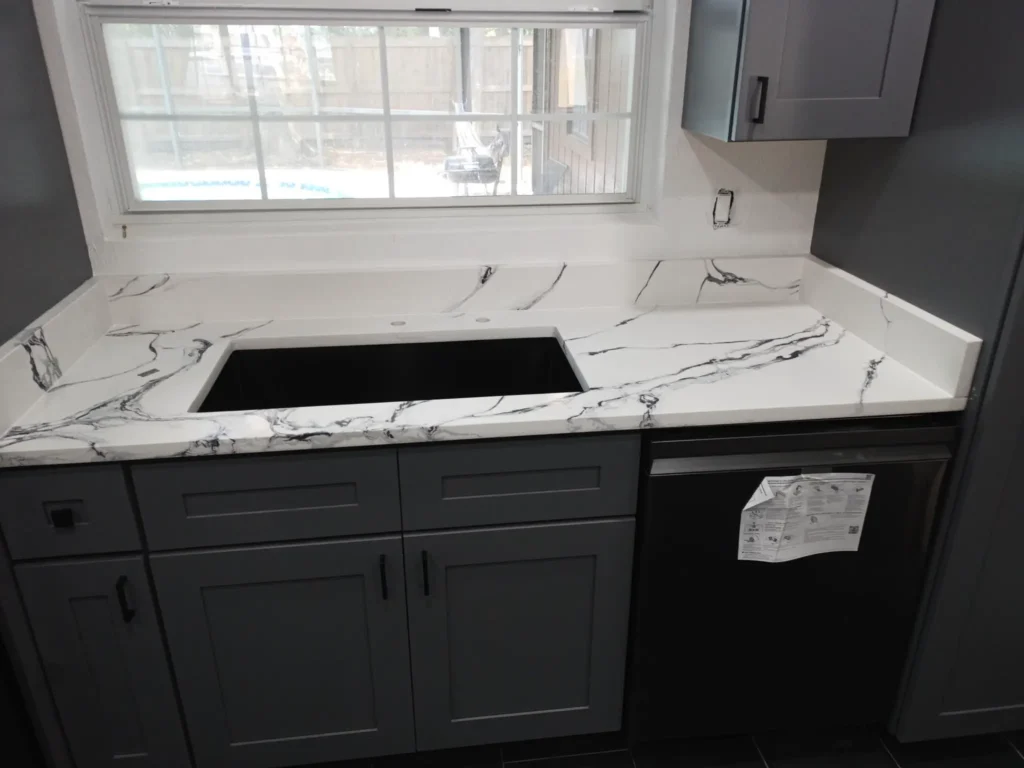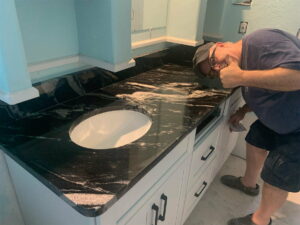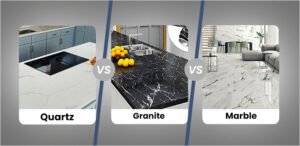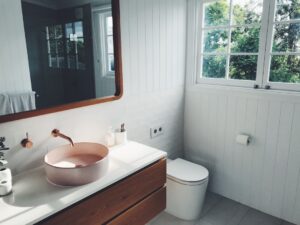Florida’s sun, sand, and vibrant lifestyle are why we love living here. However, the one constant companion we could do without is the humidity. This ever-present moisture in the air doesn’t just make for sticky summer days; it poses a unique challenge to maintaining the beauty and longevity of your home’s finest features, especially your granite and quartz countertops. For homeowners, property managers, and Airbnb hosts, the pristine condition of a kitchen or bathroom can be a major selling point, and in the Sunshine State, a little extra care goes a long way.
At EdStone, we’ve installed countless stunning countertops in homes and properties across Florida. We understand that these surfaces are more than just functional; they are an investment in your property’s value and aesthetic appeal. That’s why we’ve put together this comprehensive guide. We’ll delve into everything from daily cleaning routines to specialized techniques for tackling the specific issues caused by our humid climate. This is your go-to resource for quartz countertop maintenance, learning how to seal granite in Florida, and how to remove countertop stains effectively, ensuring your investment remains as breathtaking as the day it was installed.
The Unseen Enemy: How Humidity Impacts Your Stone Countertops
Before we dive into the “how-to,” it’s crucial to understand the “why.” Florida’s high humidity creates an environment where moisture is constantly trying to settle on and seep into surfaces. For porous materials like natural stone, this can be problematic.
- Mold and Mildew Growth: The combination of warmth and moisture is a breeding ground for mold and mildew, which can develop in the caulk lines around your countertops or even in the stone’s pores if not properly sealed.
- Stain Absorption: For unsealed or poorly sealed granite, humidity can exacerbate stain absorption. Spills that might be simple to wipe up in a drier climate can set faster and penetrate deeper when the ambient air is already saturated with moisture.
- Dulling and Etching: Certain cleaners, especially acidic ones, can react with the minerals in stone. In a humid environment, residual moisture can prolong contact with these harmful substances, leading to a dull or etched appearance over time.
Understanding these risks is the first step toward effective prevention. With the right knowledge and a consistent routine, you can easily combat the effects of humidity and keep your countertops in showroom condition.
Effortless Elegance: Daily and Weekly Quartz Countertop Maintenance
Quartz is a homeowner’s dream. As a non-porous engineered stone, it’s highly resistant to staining and doesn’t require sealing. However, “low maintenance” doesn’t mean “no maintenance.” A simple, consistent care routine is key to preserving its flawless finish, especially in a place where surface moisture is common.
Your Daily Quartz Care Routine (2 Minutes)
This quick daily wipe-down is your first line of defense against grime and bacteria.
- Clear the Surface: Remove any crumbs, spills, or debris.
- Gentle Soap and Water: Mix a few drops of mild dish soap with warm water in a spray bottle. Lightly mist the countertop.
- Wipe with a Soft Cloth: Use a clean, soft microfiber cloth to wipe down the entire surface. The microfiber is excellent at trapping dust and absorbing moisture without being abrasive.
- Rinse and Dry Thoroughly: Spray the counter with plain water to rinse away any soap residue, then immediately dry it with a separate clean cloth. This final drying step is crucial in a humid climate to prevent water spots and discourage mildew growth.
Your Weekly Quartz Deep Clean (5-10 Minutes)
Once a week, give your quartz a slightly deeper clean to tackle any buildup and ensure it remains sanitary.
- Follow the Daily Steps: Start with the soap and water cleaning method described above.
- Tackle Problem Spots: For any dried-on food or stubborn spots, use a plastic putty knife or a non-abrasive sponge to gently lift the residue. Never use metal scrapers or abrasive pads like steel wool, as they can scratch the surface.
- Sanitize Safely: For a deeper clean and to disinfect stone surfaces safely, create a solution of equal parts 70% isopropyl alcohol and water. Spray it on the countertop, let it sit for a minute, and then wipe it clean with a fresh, damp cloth. Follow with a thorough drying. This is a much safer alternative to harsh chemical disinfectants that can damage the resin in your quartz.
This simple quartz countertop maintenance schedule is all it takes to keep your engineered stone looking vibrant and new for years to come.
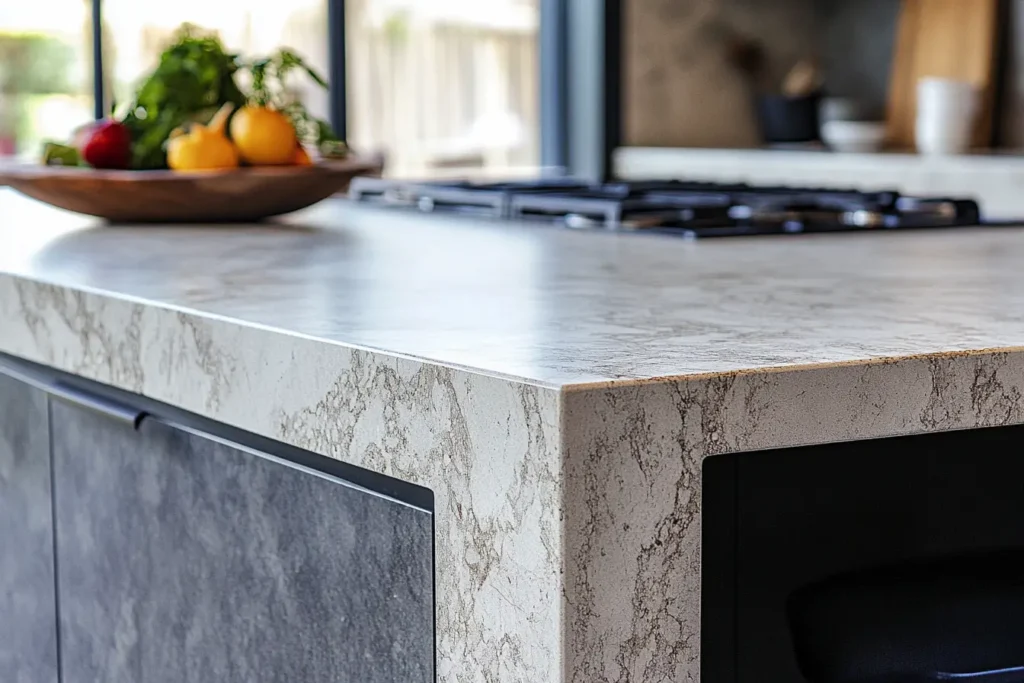
Fortifying Your Granite: How to Seal Granite Properly for Florida Homes
Unlike quartz, granite is a natural, porous stone. Think of it like a dense sponge. Sealing is the process of filling those microscopic pores to create a protective barrier against spills and moisture. In Florida, where moisture is always in the air, a high-quality seal is not just recommended—it’s essential.
How to Tell if Your Granite Needs Sealing
The “water test” is the easiest way to check your seal’s integrity.
- Pour a small puddle of water (about 3 inches in diameter) onto the surface.
- Let it sit for 15-30 minutes.
- Wipe up the water. If the stone underneath has darkened, it means it has absorbed the water, and it’s time to reseal. If the water beaded up and the stone’s color is unchanged, your seal is still holding strong.
We recommend performing this test annually. For most kitchens, sealing is needed every 1-3 years, but factors like heavy use and the specific type of granite can influence this frequency.
A Step-by-Step Guide to Sealing Granite
Learning how to seal granite in Florida is a straightforward DIY project. The key is to work in a well-ventilated area and follow the product instructions carefully.
- Choose the Right Sealer: Look for a high-quality impregnating sealer specifically designed for natural stone. These penetrate the surface rather than just sitting on top.
- Thoroughly Clean and Dry: Clean your granite countertop with a pH-neutral stone cleaner and allow it to dry completely. We mean completely. Sealing a damp countertop can trap moisture, leading to a hazy, clouded appearance. In our humid climate, you may want to wait 24 hours after cleaning to ensure it’s bone-dry.
- Apply the Sealer: Following the manufacturer’s directions, apply the sealer evenly over the surface with a clean, lint-free cloth. It should look wet, but not puddled.
- Let it Penetrate: Allow the sealer to absorb into the stone for the time specified on the product label, usually around 15-20 minutes.
- Remove the Excess: This is the most critical step. After the penetration time, wipe away all excess sealer from the surface with a dry, clean cloth. If you leave excess sealer to dry on the surface, it will create a streaky, hazy film that is very difficult to remove.
- Cure: The sealer needs time to fully cure, typically 24-48 hours. During this time, keep the countertop dry and avoid placing any items on it.
By properly sealing your granite, you create an invisible shield that is indispensable for humid climate kitchen care.
The Stain Game: Techniques to Safely Remove Common Countertop Stains
Even with diligent care, spills happen. The key is to act quickly and use the right technique. Here’s how to remove countertop stains from both granite and quartz.
General Stain Removal Tips:
- Blot, Don’t Wipe: For fresh spills, blot immediately with a paper towel to absorb as much liquid as possible. Wiping can spread the stain.
- Know Your Enemy: The treatment depends on the type of stain.
- Always Test First: Before using any cleaning solution, test it on a small, inconspicuous area (like behind an appliance) to ensure it doesn’t cause discoloration or damage.
Tackling Common Stains:
- Oil-Based Stains (Grease, Cooking Oil, Cosmetics): These will darken the stone.
- Solution: Create a poultice—a thick paste made from baking soda and water. Apply the paste to the stain, cover it with plastic wrap, and tape down the edges. Let it sit for 24 hours. The baking soda will draw the oil out of the stone. Afterward, remove the poultice, rinse with water, and dry. You may need to repeat this process for stubborn stains.
- Organic Stains (Coffee, Tea, Wine, Fruit): These often have a pinkish-brown color.
- Solution (for Granite): A few drops of 12% hydrogen peroxide mixed with a few drops of ammonia can often lift the stain. Apply, let it sit for a few minutes, then wipe and rinse.
- Solution (for Quartz): For quartz, a paste of Bar Keepers Friend (the powder, not the liquid) and water can be effective. Apply the paste, let it sit for 5-10 minutes, then gently scrub with a soft sponge and rinse thoroughly.
- Water Stains and Rings: These are common in our climate due to hard water deposits.
- Solution: For these mineral deposits, gently buff the area with a super-fine #0000 grade steel wool pad (for polished granite ONLY—never use on quartz or honed granite). For quartz, a non-abrasive cleaner and a bit of elbow grease are usually sufficient.
Beyond the Countertop: Best Practices for Humid Climate Kitchen Care
Maintaining your countertops is part of a larger strategy for a healthy kitchen in Florida. Preventing mold and mildew requires thinking about the entire environment.
- Promote Air Circulation: Use your kitchen’s exhaust fan whenever you’re cooking to vent steam and odors outside. If you don’t have an exhaust fan, a small oscillating fan can help keep the air moving, discouraging moisture from settling.
- Check Your Seals: Regularly inspect the caulk seals around your sink and where the countertop meets the backsplash. If they are cracked, peeling, or show signs of mildew, it’s time to remove the old caulk and apply a fresh bead of silicone caulk designed for kitchens and baths.
- Wipe Down Sinks and Faucets: After doing dishes, take an extra 30 seconds to wipe down your sink and faucet. This small habit prevents water from pooling and creating a welcoming environment for mold.
- Manage Under-Sink Areas: This is a prime spot for humidity and leaks. Keep the area under your sink clean and uncluttered. Consider placing a small, rechargeable dehumidifier or moisture-absorbing container in the cabinet, especially if you manage a property that may sit vacant for periods.
The Final Polish: How to Disinfect Stone Surfaces Safely
In today’s world, especially for Airbnb hosts and property managers, disinfecting surfaces is a top priority. However, many common disinfectants like bleach, vinegar, and ammonia-based cleaners are far too harsh for granite and quartz, and can cause permanent damage, etching, or discoloration.
The safest and most effective way to disinfect stone surfaces safely is to use a product specifically formulated for them or a simple, homemade solution.
- Recommended Solution: As mentioned for quartz, a 50/50 mix of 70% isopropyl alcohol and water is an excellent disinfectant for both granite and quartz. It kills germs effectively and evaporates quickly without leaving a residue or damaging the stone’s seal or finish.
- Commercial Stone Cleaners: Look for products that are labeled as a “pH-neutral cleaner and disinfectant for natural stone.” These are readily available and provide peace of mind.
Protecting Your Investment for the Long Haul
Your granite and quartz countertops are the centerpiece of your kitchen. With a little consistent effort and the right techniques, you can easily protect them from the unique challenges of Florida’s humidity. By establishing a simple daily routine, staying on top of sealing your granite, tackling spills promptly, and using stone-safe products, you ensure that your investment continues to pay dividends in beauty and value for years to come.
Are your countertops in need of professional care? Whether it’s a deep-seated stain that won’t budge, a chip or crack that needs repair, or you’d simply prefer a professional to handle the sealing, EdStone is here to help. Our team of stone experts provides a full range of countertop maintenance and restoration services.
Contact EdStone today to schedule a consultation or explore our recommended stone care products. Let us help you keep your countertops looking timelessly beautiful.

